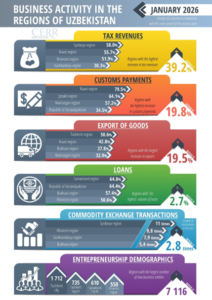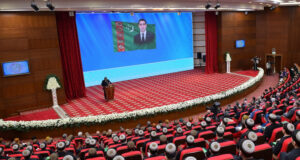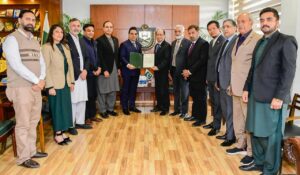Analytical Review of Round Table Conference in Islamabad Marking the 30th Anniversary of Turkmenistan’s Neutrality in the International Year of Peace and Trust 2025

On October 28, 2025, a remarkable roundtable conference was held at National Language Promotion Department (NLPD) in Pakistan to commemorate the 30th anniversary of Turkmenistan’s neutrality. Organized jointly by The Gulf Observer, the Gulf Observer Research Forum, and the Embassy of Turkmenistan in Pakistan, the event took place in the International Year of Peace and Trust, marking a significant milestone in global diplomacy and interregional cooperation.
Moderated by The Gulf Observer’s Patron-in-Chief, Muhammad Ali Pasha, the roundtable brought together a distinguished gathering of scholars, writers, academicians, journalists, and opinion leaders. Notable attendees included the UN Resident Coordinator in Pakistan, Mohamed Yahya, along with representatives from Pakistani think tanks, media outlets, and academic institutions. The diversity of participants underscored the widespread recognition of Turkmenistan’s neutrality as a global paradigm for fostering dialogue and cooperation.
The speakers unanimously praised Turkmenistan’s foreign policy of neutrality, highlighting its constructive role in promoting peace, trust, and mutual understanding both regionally and globally. Guided by the strategic vision of the National Leader of the Turkmen people, Gurbanguly Berdimuhamedov, and under the leadership of President Serdar Berdimuhamedov, Turkmenistan has maintained a consistent course of peaceful diplomacy. This approach emphasizes conflict prevention, dialogue facilitation, and sustainable development—a model increasingly relevant in today’s multipolar world.
The event underscored the historic significance of Turkmenistan’s neutrality, which, as affirmed by UN General Assembly resolutions, represents a unique and successful framework for managing hostilities through negotiation and peaceful settlement. Turkmenistan has consistently provided a pragmatic platform for bilateral cooperation, fostering regional peace, socio-economic progress, and intercultural understanding. The roundtable highlighted the tangible impact of these policies, with Turkmenistan acting as a mediator and example of diplomatic resilience in resolving conflicts among nations, regions, and ethnolinguistic groups.
Muhammad Ali Pasha’s leadership in organizing the event received vociferous acclaim, with special acknowledgment from Ambassador A. Movlamov of Turkmenistan, reflecting the exceptional coordination between The Gulf Observer and the Embassy. Their collaborative efforts strengthened the narrative of Pakistan-Turkmenistan brotherhood and emphasized the strategic importance of fostering regular platforms to discuss and promote mutual progress.
The roundtable also served as a cultural bridge, highlighting the shared linguistic, religious, and historical affinities between Pakistan and Turkmenistan. Ambassador Movlamov outlined Turkmenistan’s achievements over the past 30 years and its active engagement in international initiatives during the “Year of Peace and Trust – 2025.” The discussion further emphasized ongoing collaboration in transformative projects such as TAPI (Turkmenistan–Afghanistan–Pakistan–India) and TAP, which aim to enhance regional connectivity and socio-economic development. References to shared heritage, including the legacy of the world-renowned Muslim saint and thinker Magtymguly Pyragy, underscored the deep-rooted cultural links that complement the strategic and economic partnerships between the two nations.
In conclusion, the October 28 roundtable was not only a celebration of Turkmenistan’s neutrality but also a demonstration of how diplomacy, culture, and shared interests can converge to promote sustainable peace. It reinforced the vital role of Turkmenistan as a model for conflict resolution and international cooperation, while simultaneously strengthening Pakistan-Turkmenistan relations. Events of this caliber are a testament to the importance of dialogue, mutual understanding, and proactive engagement in fostering peace, trust, and regional prosperity.


